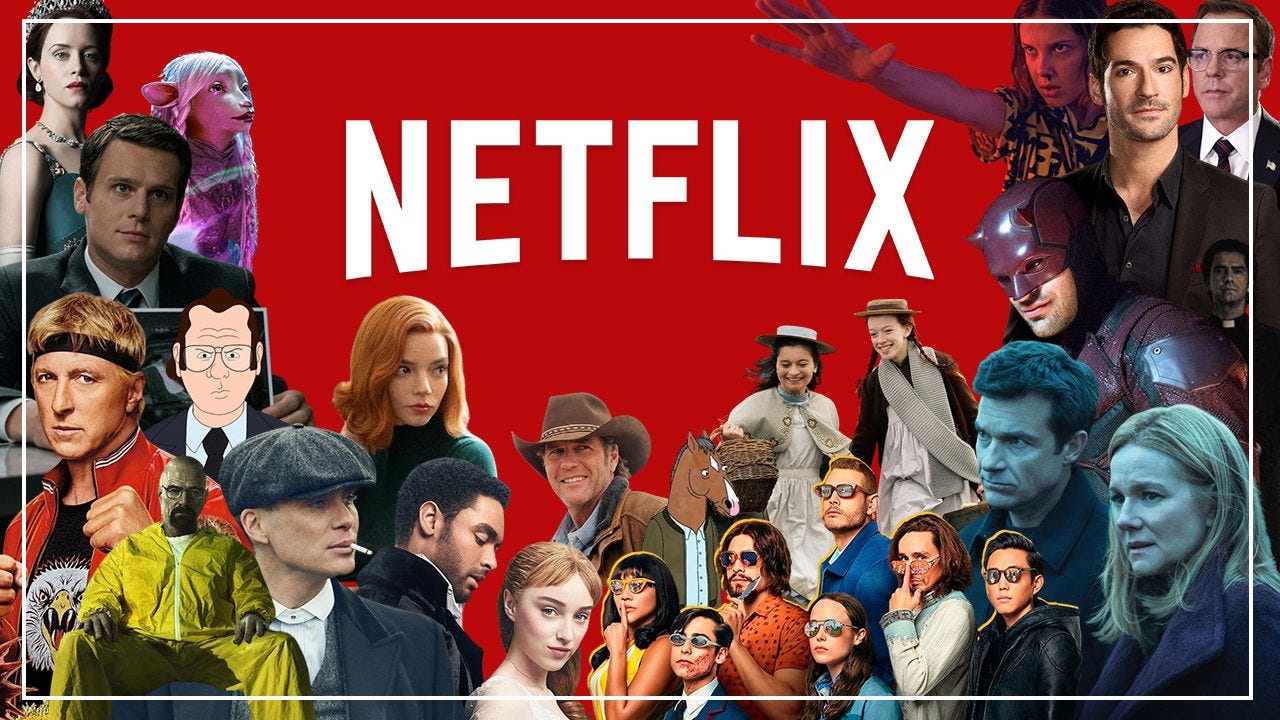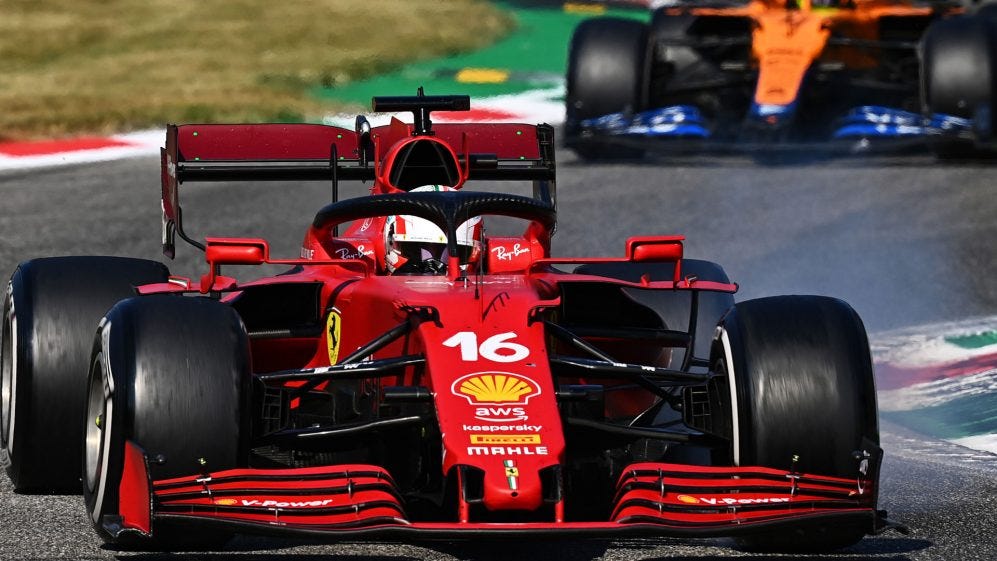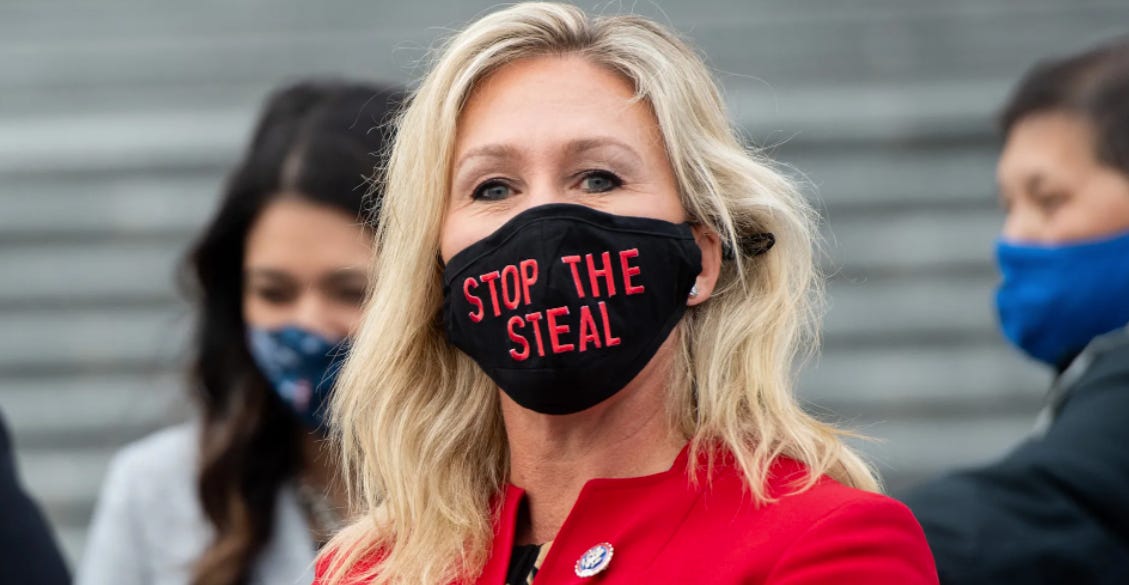PPPPlayback & Fast Forward (Four P's #185)
Netflix Fan Tokenization (NFT), AppleTV+'s Severance, Formula 1 & MTG
A popular song once proclaimed there to be "57 channels and nothin' on."
In addition to their literal meaning, Bruce Springsteen's lyrics written 30 years ago also dig more deeply into the challenges and struggles one finds when reaching "the top." Success can be a mountain one climbs up or down quite gradually over time... or a cliff whose sheer face and steep drop can end things much more quickly.
Something Professional: Netflix Fan Tokenization (N.F.T.)
Last week, Netflix reported a massive decrease in its paying subscriber base. The media giant says it lost 200,000 subscribers in Q1 and expects to lose as many as 2 million more during Q2. There are a few reasons for this, but the most evident are: inflation, the waning days of homebound pandemic (hopefully), as well as a reduction in quality programming. Netflix also has more competition than ever from the likes of HBOMax , Apple+ Disney+, Peacock, Amazon's PrimeVideo.
Netflix innovation changed me as a content consumer in a number of ways. First, the quality of its streaming app (plus the improvements of iPhone screens) enabled me to watch shows on mute with subtitles while lying in bed as my wife slept. Netflix was also the first streaming platform I watched that did not have commercials. The first iterations of TiVO and DVR introduced this concept, but even now, our paid subscriptions to Hulu and Peacock come with painful commercial breaks (though they wouldn't be as bad if they showed more than the same four ads over and over again).
Netflix didn't invent "binge" viewing (DVD sets of full series did that), but they certainly popularized it. The combination of accessibility and availability that it provides all but killed the last shreds of patience I had. More specifically, it squashed my interest in, and capacity for, watching partial seasons of new shows, or even weekly (serialized) programs that required waiting 7 days for the next episode. Unlike HBOMax and AppleTV, which don't upload all episodes of a full season at once, Netflix remains my favorite streaming platform because it enables us to find a complete series and watch it start to finish.
The introduction of the "Watch Next Episode" feature has contributed to many sleepless nights, and more than a few lazy afternoons. In doing so, Netflix obliterated a favorite entertainment hook, the "cliffhanger," or the deliberate, season-ending suspense over whether a protagonist survives the impending doom she or he is facing. So how's it going to end for Netflix? What does CEO Reed Hastings do now?
Skipping right to the next episode of Netflix' story, they are planning a number of remedies to right the ship. The biggest change will be the introduction of a lower-priced subscription tier with ads. My media and agency friends are salivating. "It's working for Hulu. Disney's doing it; HBO did it. I don't think we have a lot of doubt that it works. You know that all those companies have figured it out," Hastings said last week.
Upon the announcement of the Netflix Q1 performance, the doubters and skeptics erupted with criticism on social media and the stock price tumbled (initially down nearly 40% last week). But I believe Netflix still has a huge advantage in this space, and it’s not in an ad-supported, Web 2.0 model. Instead, Netflix can (and should) be considering a tokenized model, as well. How could this work? Imagine tiers of membership with smart contracts, where "sharing your password" could even be incentivized and rewarded... and token holders VOTE on which shows stay and go, which new shows air, etc. Those tokens could also unlock exclusive, gated experiences, access, even commerce. If you want to know how NFTs can truly change the landscape of everything, let's start here and now.
NFTs will be a key to Value-Exchange Utility with all brand-to-consumer relationships in a short time. At the moment, there are two turnkey, viable use cases for companies with established fan bases.
Collecting an NFT to earn value and rewards:
Membership Passes = access, feedback, gated experiences within the community (virtual events, livestreams, voting, governance) or outside (Discord, tickets to IRL events)
Gamified Challenges = prizes, access, information, gated commerce (exclusive products, discounts)
Engagement and commerce to unlock an NFT:
Attend an event = NFT as proof of attendance
Buy a physical product = NFT as proof of purchase
Participate and provide feedback = NFT as token of appreciation.
In contrast with the open marketplaces and crypto/NFT exchanges, Mint provides brands with a contained (but not closed) platform to define and deliver meaningful Value-Exchange Utility with a convergence of Web 2.0 (Views) & Web3 (VEUs) technology. Brands and marketers (like Netflix) will succeed when the two-way exchange with viewers, consumers and fans becomes a positive feedback loop and multi-directional model for brand-building, relationship-building, & community-building.
Something Practical: Cutting the Corpus Callosum
Have we waited long enough to talk about "Severance?"
There are so many things I've wanted to say, write and discuss, but I've waited for enough friends, colleagues, family members and, yes, co-workers to watch before tacking it head on. I know it's not a Netflix show, but if you haven't watched this Apple TV+ masterpiece yet, I'll try to avoid any and all spoiler alerts (and promise to go back and edit this one more time after I'm finished writing just to be sure). The final episode of the first season aired nearly a month ago, and while I'd heard many great things about it for several weeks while new episodes were aired, I deliberately waited until the entire season launched to binge. I watched all 10 episodes in a 36-hour period, and it has been my favorite initial season of a tv/streaming show in years, maybe since Netflix’ Casa de Papal ("Money Heist").
Severance stars Adam Scott, Zach Cherry, Britt Lower, John Turturro, Christopher Walken, Patricia Arquette and a great supporting cast. The thriller, which also had many, many comedic moment, tells the story of employees at a fictional company who have agreed to undergo a procedure that effectively divides their conscious selves into two halves: an at-work self and an outside-of-work self. Memories and knowledge is not passed between the two worlds. What happens at work stays at work. What happens at home stays at home. Sounds creepy and scary and weird... but also makes one think about the benefits of bifurcating your work-life balance in a more permanent and official way. Who doesn't wake up in the middle of the night thinking about work from time-to-time? And who doesn't get distracted by some personal issues during the workday?
I often remark that I wish I could "turn off my brain" at night. Severance takes it one step (or many steps) further. Imagine... the trauma of a physician losing a patient on the operating table gets left behind when they leave the hospital... the disappointment of a failed business deal disappears before arriving home for dinner. Or imagine being a digital marketer in the early days of web3 trying to keep up with every new project, every new opportunity day and night. Also not having to worry about getting a call during the day from the school nurse because your kid got kicked in the face with a soccer ball sounds like a dream.
Something Personal: Formula For Addiction
For all of the criticism of Netflix in the past week, one set of voices you likely won't hear from is the fanbase of auto racing. That's because the "Netflix Effect" continues to pay big dividends for the European-based-now-global-phenomenon that is Formula One.
Formula 1 racing has been around for 50+ years, but its popularity in the United States didn't soar until the last 3-4 years. In family, it was even more recent than that. My son got the F1 game for his PS5 over Christmas at the same time I crushed all four seasons of Netflix docu-series Drive to Survive in just under a week. We've already woken up early to watch live races in Europe and Asia, as well as the qualifying laps AND the practice runs. I routinely use terms like "chicane," "porpoise," and "slipstream" when driving 40 mph on local roads.
Formula 1 has a debut race coming to Miami in a couple of weeks, has already established an annual Austin race every fall, and will introduce a third American race in Las Vegas starting after another season. This professional sports "league" only has ten top division teams, each with two drivers/cars, competing on road and track courses all over the world from May through the fall. These teams spend hundreds of millions of dollars in car development, optimization, and travel. They also earn even more in sponsorship and prize money.
Three teams have dominated the sport over the past two decades (and beyond): Ferrari, Mercedes, and Red Bull. This year, Formula 1 introduced budget caps to bring more parity to the sport, and all cars are required to conform to similar technical specs, yet the differences between the top teams, middle teams (McLaren, Aston Martin, Renault, Alfa Romeo) and lower-tier teams (poor Williams and Haas teams!) is quite stark. Within another few years, I can see F1 challenging NASCAR, and even surpassing it here in terms of popularity. Yes, there are many more NASCAR races in the U.S., but Formula 1 has a ton of money... and so do its fans.
Something Political:
I don't watch much live television these days, with the only exception being our first-place New York Mets and the news. Yet some must-see TV this past Friday afternoon unfolded as Georgia congresswoman Marjorie Taylor Greene was challenged in court for her role in the January 6, 2021 insurrection. According to a post-Civil War law, no member of Congress can run for re-election if they participated in rebellion against the United States.
Greene, for her part, said she had no knowledge of any attempts to block the vote counting. On the stand, she denied ever stating that she believed Trump was the true winner of the election. The challenging attorneys then showed video of her spreading misinformation about The Big Lie. It's clear that she not only has a challenged relationship with the truth, but it was humorously sad that she had trouble recalling her own previous quotes and speeches while on the stand.
The incredible lack of interest in getting to the bottom of what happened behind the scenes on that deadly day on Capitol Hill is telling. There is clear, irrefutable proof that GOP members of Congress were involved in meetings at the White House aimed at overturning the 2020 Presidential election results. Yet here we are, just a few months away from the 2022 elections, and there have been no punitive consequences. But, hey, at least the GOP has its priorities straight and is now going after a real enemy of the people... Disney.







